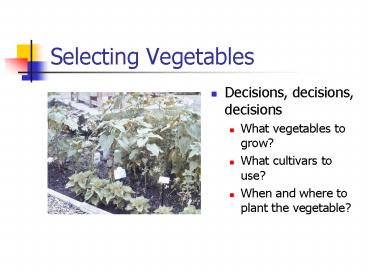Selecting Vegetables - PowerPoint PPT Presentation
1 / 22
Title: Selecting Vegetables
1
Selecting Vegetables
- Decisions, decisions, decisions
- What vegetables to grow?
- What cultivars to use?
- When and where to plant the vegetable?
2
Deciding What Vegetables to Grow
- You can not grow everything, so you will have to
make choices - Grow what you can ________ , are unavailable, or
in poor quality in stores - Grow plants that fit into your gardens
succession planting and ______________ - Select vegetables that fit into the available
space - Select vegetables adapted to the particular
______________ or environmental conditions in
your garden
3
Deciding what vegetables to grow
- What vegetables do you use?
- Are there any vegetables that you like or
dislike? - Are there vegetables that are easier to purchase
at stores? - _____________
- Melons
4
Succession Plantings
- Two types
- 1. Multiple plantings of the same crop
- Varietal succession Planting a range of
cultivars having different ____________ dates at
the same time. - Temporal succession Planting the _________
cultivar periodically over the course of the
season. - 2. Planting different species of vegetables, one
after the other
5
Succession plantings with different vegetable
species
- Planting more than one species of vegetables
during the same growing season - The maturity (days from planting to _________) is
important when planning a session - The adaptation of the vegetable to environmental
conditions at planting is also important
- Examples of different maturities
- Short
- Spinach
- ____________
- Middle
- ____________
- Sweet corn
- Long
- Onions
- ____________
6
Crop Rotation
- Can think of as succession over a number of years
- Underlying principle is never plant the same crop
or its relative in the same place two years in a
row. - Reasons for ________________
- Balances nutrient demands of different crops
- Leaf crops require high N
- Fruit crops require high ___________________
- Legumes fix N from atmosphere
- Reduces pest attacks
- Aim is to break disease cycles
7
Crop Rotation
8
Vegetables Grouped by Plant Families
Squash Mustard Tomato Beet
Muskmelon Cabbage Tomato Beet
__________ Broccoli __________ Spinach
Cucumber Cauliflower Potato __________
9
Vegetables Grouped by Plant Families
Onion Legumes Carrots
Onion ___________ Carrots
Leek Peas ___________
___________ Parsnip
10
Select vegetables that fit into the available
space
- Methods to allow vegetables to fit into small
spaces - Bush types instead of _____________ or pole types
- Draft types
- ______________
11
Cool vs. Warm Season Vegetables
- Vegetables differ in their adaptation to growing
season - Relates to growth response to temperature
- _____________ season vegetables
- Can withstand light frosts
- Best growth early in spring or late fall
- Are smaller in size and shallower root system
than warm season - Generally eat a vegetative part (root, _________,
leaves) - Most are _________________
12
Biennials
- Live two growing seasons
- First growing season produce vegetative
structures (leaves and _______ roots) - After exposure to cold temperatures
- Produce a _________________
13
Cool versus warm season vegetables
- ______________ season vegetables
- Do not tolerate frosts
- Grow best when temperatures are warm
- Most are annuals
- Generally eat a _______________ or seed
14
Table Vegetables grouped by seasonal adaptation
Cool Season Warm Season
Lettuces ____________ Cucumbers Sweet corn
Turnips Radish Muskmelons _________________
Pea Cauliflower ____________ Tomatoes Peppers Lima beans
15
Selecting Cultivars
16
Selecting Cultivars
- Once you have decided on specific vegetables you
need to decide on which cultivars to grow - There are often hundreds of different cultivars
available for each vegetable species - _____________ and Cultivar are often used
interchangeably - Are different from a botanical standpoint
- Varieties are botanical subdivisions within a
species - Example
- _________ is the species Zea mays
- Sweet corn is a variety of corn
17
Selecting Cultivars
- Cultivars are plants within varieties that
____________________ have developed and that are
distinct from each other. - New cultivars are generally bred for commercial
growers - Two major categories of vegetable cultivars are
- Open pollinated
- ____________________
18
Selecting Cultivars
- Open-pollinated vegetables
- Plants are left to become pollinated on their own
- Are often older or ___________________ cultivars
- It is important that the cultivar breed true
- Offspring resemble their parents in all important
characteristics - The breeding system of the vegetable will
determine if an open-pollinated vegetable breeds
true - Self-pollinated vegetables
- Will produce ______ or more offspring that are
true to type - Cross-pollinated vegetables
- To ensure the plants __________ true, you must
carefully control the parents
19
Selecting Cultivars
- Hybrid vegetable cultivars
- Definition A cultivar resulting from a cross
between two different true breeding (referred to
as ______________) parents - Most new vegetable cultivars are hybrids
- Advantages
- They are vigorous
- Hybrid ______________ a synergistic increase in
vigor of the plant due to the combination of
widely diverse genetic traits - Higher yielding
- They are apparently uniform
- Often bred for _________________ resistance
20
Selecting Cultivars
- Hybrid cultivars
- Disadvantages
- Mainly bred for _________________ growers
- Mature at same time
- Can not collect seed, must purchase new seed each
year
21
Selecting Cultivars
- There are some specialized cultivars within
either open-pollinated or hybrid categories - Heirloom cultivars
- Definition A cultivar that has been passed down
generation to generation - _________________ corn found in a Utah cave
and is thought to be more than 800 years old - There are a number of nonprofit organizations
working with people who want to preserve heirloom
plants.
22
Selecting Cultivars
- All American Selections
- Cultivars that perform ____________ in trials
conducted throughout the country - Problems
- Not all cultivars included
- May not do well in a specific locations
- May not have ___________________ desired by
gardener































